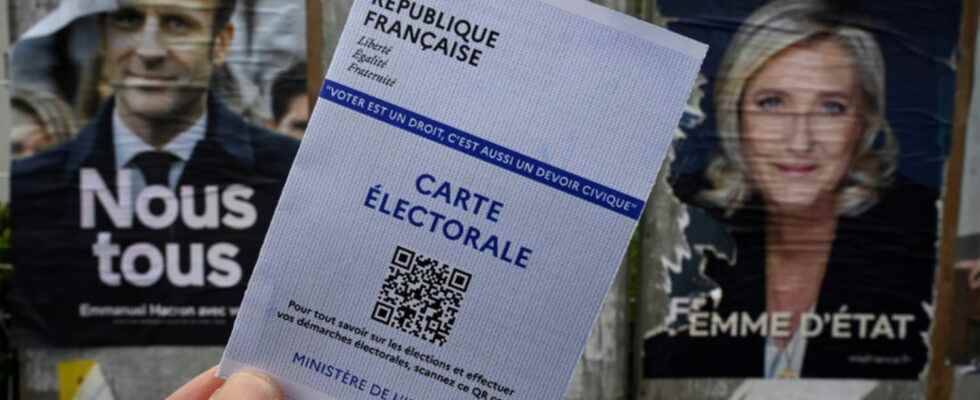Emmanuel Macron or Marine Le Pen? First voters from Overseas and abroad vote on Saturday, time difference obliges, for a presidential election with colossal stakes. Before the opening of the polls on Sunday morning in mainland France.
Off Canada, the archipelago of Saint-Pierre-et-Miquelon will be the first overseas territory to put a ballot in the ballot box from 08:00 local time (12:00 p.m. in Paris), followed by Guyana then the Antilles, the Pacific and the Indian Ocean.
Since Friday midnight, the campaign is officially over. Public meetings, distribution of leaflets and digital propaganda of the candidates are prohibited. No interview, poll or estimate of results may be published before the results on Sunday at 8:00 p.m.
Some 48.7 million French people have the choice, as in 2017, between two candidates with a radically opposed program to lead a driving force country of the European Union, in a particularly tense international context with a war raging on the borders of Europe. EU.
Europe, economy, purchasing power, relations with Russia, pensions, immigration: these are two projects with deep differences which seem to embody more than ever two Frances, after a five-year period studded with multiple crises, from “yellow vests” to the Covid-19 pandemic.
On the one hand, Emmanuel Macron, 44, who wants to go beyond the left / right divides. Given favorite in the polls, he hopes to become the first president of the Fifth Republic re-elected by universal suffrage outside cohabitation by calling to block the far right, promising lower taxes, pension reform and more ecology.
On the other, Marine Le Pen, 53, a far-right candidate – a term she rejects – is on her third attempt. Hardly beaten 5 years ago (33.9% of the vote), she hopes to make the opinion polls lie by mobilizing an anti-Macron front on the theme of the defense of purchasing power and the fight against immigration.
– “Difficult to govern” –
But “whoever wins, the country will inevitably be more difficult to govern in the next five years,” political scientist Chloé Morin told AFP.
“If Emmanuel Macron is re-elected, the method of voting in the legislative elections should lead to (the) more radical oppositions being fairly weakly represented in Parliament. They will therefore be more in a media opposition or in the street than in a parliamentary opposition or in a culture of compromise,” she said.
Referee and great unknown in the ballot, abstention is likely to be high, even higher on Sunday than in the first round (26.31%). Just like the blank and null ballots which had reached a record in 2017, attesting to the refusal of millions of French people to choose between the two finalists.
In their latest surveys, the Ifop and Ipsos Sopra Steria institutes estimate abstention at between 26% and 28%, below the record for a second round in 1969 (31.1%).
According to Martial Foucault (Cevipof), “the greater the abstention, the more the difference in voting intentions is bound to be reduced”, pointing out “a real risk for Emmanuel Macron”.
Additional risk for participation, the three school zones will be on vacation this weekend, with in particular the start of spring break for the Paris region.
The participation in Overseas will therefore give a first trend on Saturday. Especially since the rebellious leader Jean-Luc Mélenchon, on the strength of his third place on April 10 with 21.95% of the votes at the national level, had come largely in the lead in the Antilles, particularly in Guadeloupe and Martinique.
His electorate – the largest reserve of votes between the two rounds – was particularly courted by the two finalists. But many LFI supporters could be tempted to shun the ballot box.
All rights of reproduction and representation reserved. © (2022) Agence France-Presse
